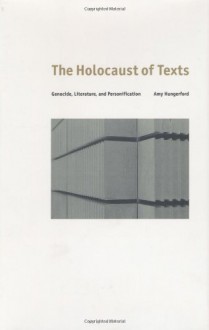The Holocaust of Texts: Genocide, Literature, and Personification
Why do we so often speak of books as living, flourishing, and dying? And what is at stake when we do so? This habit of treating books as people, or personifying texts, is rampant in postwar American culture. In this bracing study, Amy Hungerford argues that such personification has become pivotal...
show more
Why do we so often speak of books as living, flourishing, and dying? And what is at stake when we do so? This habit of treating books as people, or personifying texts, is rampant in postwar American culture. In this bracing study, Amy Hungerford argues that such personification has become pivotal to our contemporary understanding of both literature and genocide. Personified texts, she contends, play a particularly powerful role in works where the systematic destruction of entire ethnic groups is at issue.Hungerford examines the implications of conflating texts with people in a broad range of texts: Art Spiegelman's Maus; Ray Bradbury's Fahrenheit 451; the poetry of Sylvia Plath; Binjamin Wilkomirski's fake Holocaust memoir Fragments; and the fiction of Saul Bellow, Philip Roth, and Don DeLillo. She considers the ethical consequences of this trend in the work of recent and contemporary theorists and literary critics as well, including Cathy Caruth, Jacqueline Rose, Jacques Derrida, and Paul de Man. What she uncovers are fundamentally flawed ideas about representation that underwrite and thus undermine powerful and commonly accepted claims about literature and identity. According to Hungerford, the personification of texts is ethically corrosive and theoretically unsound. When we exalt the literary as personal and construe genocide as less a destruction of human life than of culture, we esteem memory over learning, short-circuit debates about cultural change, lend credence to the illusion or metaphysics of presence, and limit our conception of literature and its purpose.Ultimately, The Holocaust of Texts asks us to think more deeply about the relationship between reading, experience, and memorialization. Why, for instance, is it more important to remember acts of genocide than simply to learn about them? If literary works are truly the bearers of ontology, then what must be our conduct toward them? Considering difficult questions such as these with fresh logic, Hungerford offers us an invigorating work, one that will not only interest scholars of American and postwar literature, but students of the Holocaust and critical theory as well.
show less
Format: hardcover
ISBN:
9780226360768 (0226360768)
Publish date: January 15th 2003
Publisher: University of Chicago Press
Pages no: 232
Edition language: English

